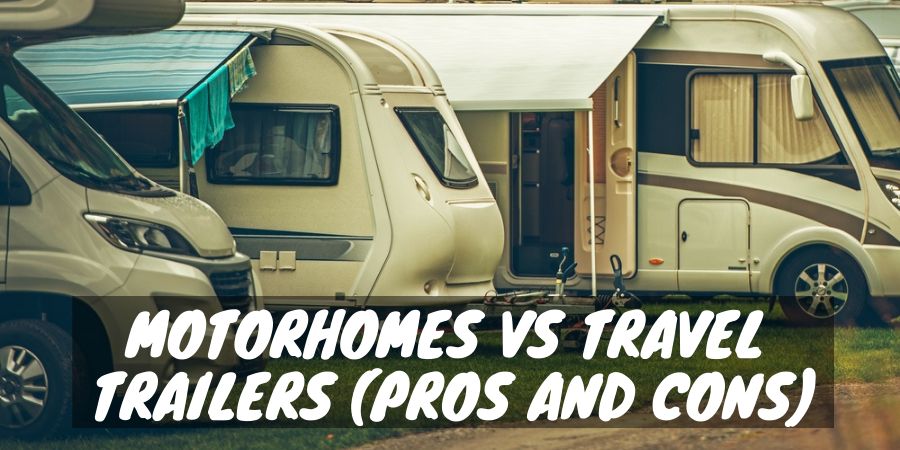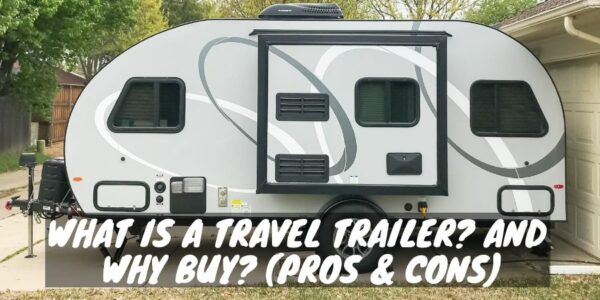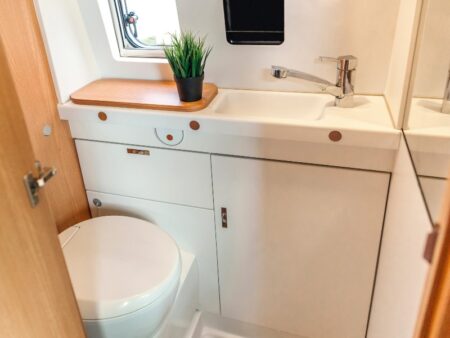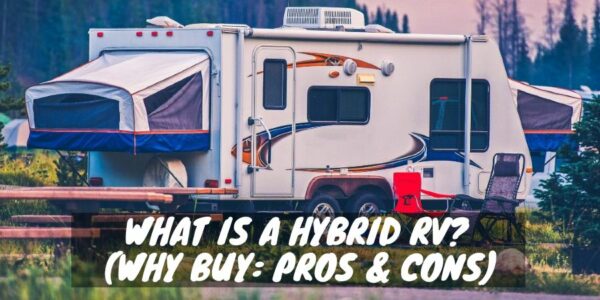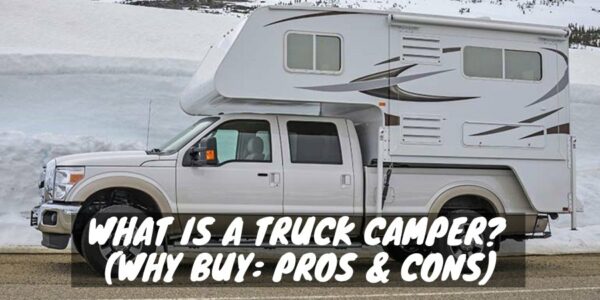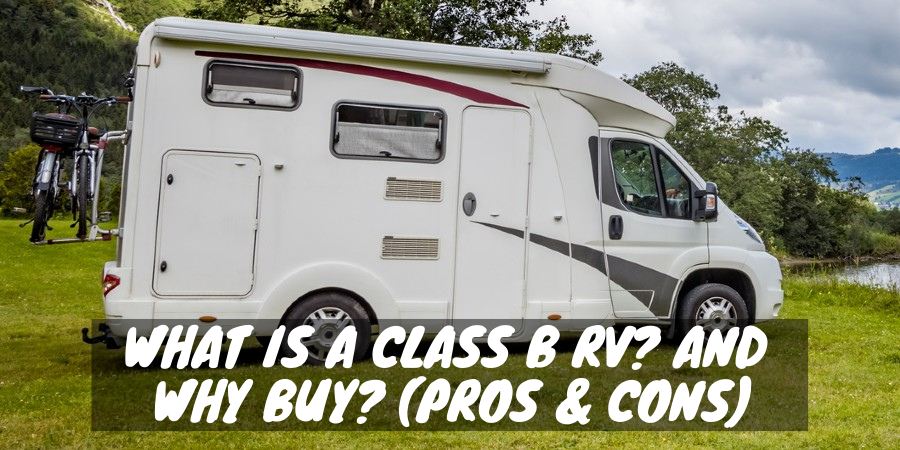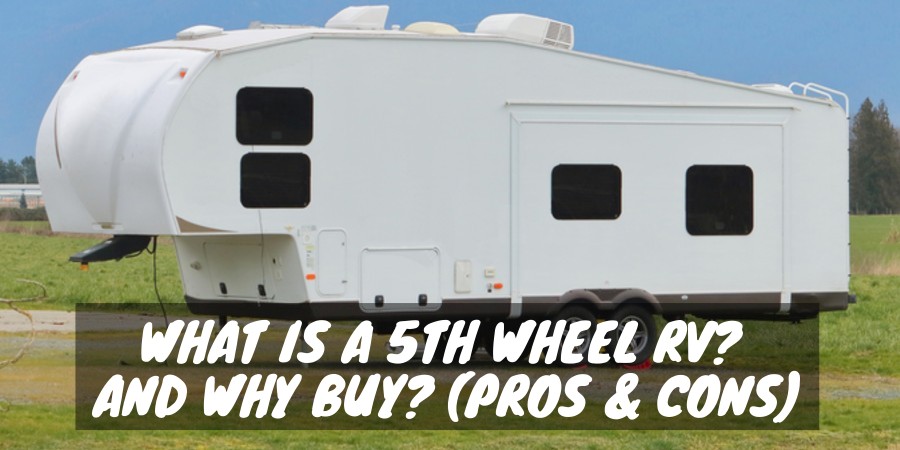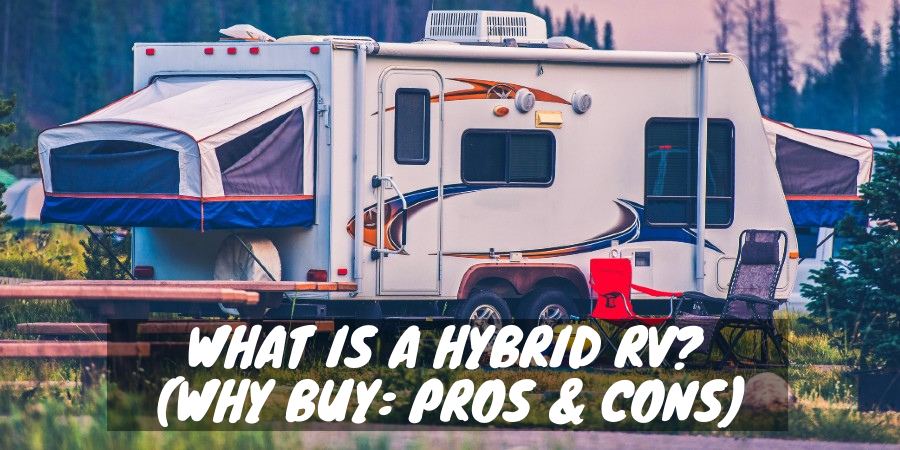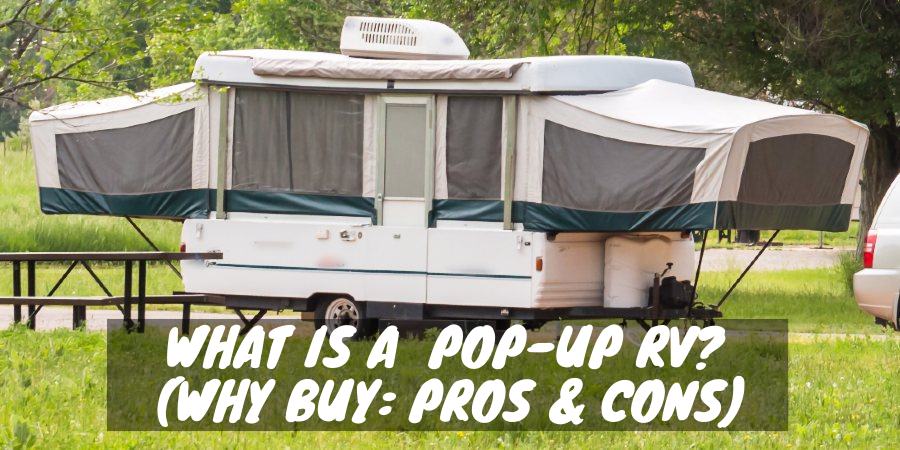Are you ready to shop for an RV but are still unsure between getting a motorhome or a travel trailer?
Both recreational vehicles have their benefits and disadvantages, but many won’t become evident until months after purchase. If you make the wrong decision, you’ll soon be trading in that new RV for one that better suits your needs.
So, make a smart first-time RV purchase by reading this guide for the pros and cons of camping with a motorhome versus a travel trailer.
Once you understand how each type of RV impacts your camping experience, you can streamline your RV shopping to save you time and money!
The Pros and Cons of Motorhomes vs Travel Trailers
Are travel trailers better than motorhomes to own? The answer depends on the needs of the user.
Both recreational vehicles are great purchases that enable people to have freedom of choice for both weekend and longer-term vacations.
To help you compare the real-life differences between a motorhome and a travel trailer, I dissect both the obvious and more subtle details that can sway your decision on which is best for you.
Price Considerations Between Travel Trailers vs Motorhomes
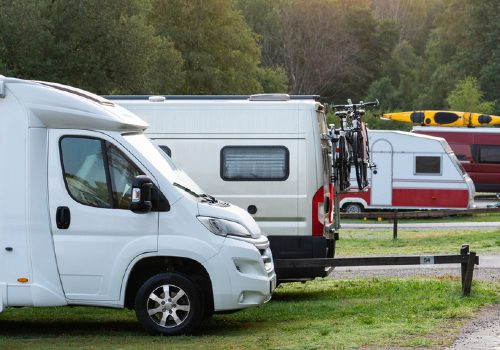
When it comes to new RV pricing, a motorhome will almost always cost more than a travel trailer.
The average cost of a small Class B or Class C motorhome is around $50,000, while you can purchase a small or mid-size travel trailer for about $20,000.
As motorhome size increases, so do the cost, with large Class A motorhomes ranging from $200,000 to well over $1M.
When you get into larger travel trailers with luxurious amenities, the price can quickly jump into the $50,000-$60,000 range. Add in the cost of a heavy-duty truck with enough towing capacity to pull it around, and your total cost can easily hit over $100K.
If you already own a tow vehicle that can pull your travel trailer purchase safely, you’re ahead of the game.
Unfortunately, many first-time travel trailer buyers don’t understand tow rating numbers and buy a camper that pushes or exceeds the limits of their vehicle.
If your vehicle doesn’t tow the camper as it should, you’ll end up upgrading to a larger, more expensive tow vehicle, which will negate your initial cost savings.
Verdict: Travel trailers provide a wider range of camper sizes and styles that are less expensive than even a small motorhome.
Depreciation Rates of Motorhomes vs Travel Trailers
If resale value is a concern when buying an RV, you need to know that motorhomes depreciate faster than travel trailers, according to RV depreciation statistics from NADAGuides.
Because there’s no engine wear and tear on a travel trailer, they hold their value better. Fifth-wheels are the only travel trailer that performs worse than some motorhomes, with these campers seeing a 71% value depreciation after ten years.
Expect a Class C motorhome to lose 50% value after five years, while a travel trailer loses 40% on average.
This normal depreciation of an RV means that buying used is the best way to afford a larger motorhome or travel trailer on a smaller budget.
Verdict: Travel trailers maintain a better resale value overall.
Camping Style vs Travel Trailer or Motorhome
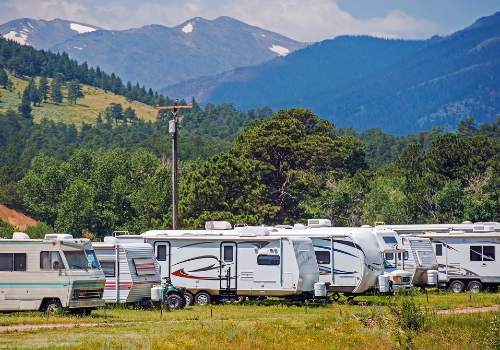
How you camp is essential to think about before buying any recreational vehicle.
Do you prefer the comforts of home, or do you like the challenge of “roughing it?”
Travel trailers come in a broader range of styles and floorplans, some with handy bathrooms and some without, so you can tailor amenities to your needs.
Motorhomes are much more cookie-cutter in terms of amenities. Almost all will have some version of bathroom and kitchen with a small living and eating area.
Motorhomes are much faster to set up at the campsite, so if you’re one to dive right into camping fun, this may be a better choice. Otherwise, you’ll need to set aside a good 30 minutes extra for set-up and tear-down when you camp with a travel trailer.
Verdict: No winner here; this comes down strictly to personal preference.
Camping Location vs Travel Trailer or Motorhome Size and Type
Where you plan to camp will play a major role in the type and size of recreational vehicle you choose.
If you plan to focus your camping at state and national parks, you’ll want to keep your max motorhome or travel trailer length to around 28-feet.
Most private or corporate campgrounds and RV parks can handle rigs up to 45-feet, but keep in mind these spots are limited and book up fast.
For standard RV campgrounds and off-grid camping with reasonably flat road access, like some BLM land, both motorhomes and travel trailers should be fine.
Consider a fuel-efficient compact Class B motorhome that fits in a standard parking space if you want to travel and explore metropolitan areas.
If you prefer very remote RV camping locations, you should either look into off-road travel trailers or beefed up motorhomes made for these types of adventures.
Verdict: For general camping, both types of RV perform equally well. For off-road camping, the travel trailer wins. For “city” camping, the Class B motorhome is best.
Road Time Comfort in a Motorhome vs Travel Trailer
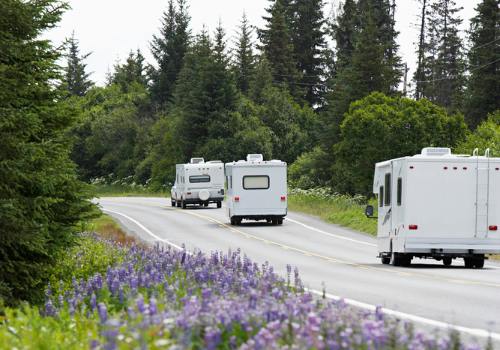
When you RV, you’ll spend plenty of time on the road, so you may wonder what is more comfortable, driving a motorhome or towing a travel trailer?
Across the board, I hear many more complaints of stress from travel trailer owners over motorhome owners.
The main reason is that most motorhome cab seats are very comfy. Once you adjust to the size when making lane changes or turns, it’s easy to forget you’re driving a motorhome at all.
Most trucks used to pull a trailer are more utilitarian and less comfortable over long hauls.
Travel trailers are also more prone to sways, vibrations, and forces during sudden stops and lane changes that impact the tow vehicle’s handling.
Fifth-wheel travel trailers have better control over these issues because the hitch is on the truck bed, which provides much more stability for the camper and reduces driver stress.
The length of a truck and travel trailer combo is also much longer than a motorhome, making it more stressful to maneuver in and out of gas stations and other stops along your route.
Aside from general handling, motorhomes also have the perk of using the interior amenities during travel. In most states, it’s illegal for people to be inside a moving travel trailer.
Passengers can use the bathroom, take a nap, or make a sandwich without stopping, saving tons of time.
If you plan to RV with pets, a motorhome provides more space for a travel crate and easier interaction that keeps them calmer over cramming them into a tow vehicle.
A motorhome also lets you monitor items moving about that may fall and break so that you can rearrange them into a safer position.
Verdict: When it comes to road-travel comfort and convenience, the motorhome wins by a landslide.
Motorhome vs Travel Trailer – Which Provides More Space?
The spaciousness of an RV depends very much on the model of travel trailer or motorhome you select.
A Class A with slides is the most spacious for a motorhome, but all motorhomes have less exterior storage than most travel trailers.
Fifth-wheels are the most spacious of travel trailers not only for their length and slide-outs but for the high ceiling height not found in most standard camping trailers.
For exterior storage, travel trailers have several large compartments that often pass through to the other side, allowing you to pack bulky camping gear like kayaks, grills, or bikes.
Interior storage in both types of campers is very similar when you compare models of equal lengths.
Verdict: For interior spaciousness and overall storage, the fifth-wheel travel trailer beats out even Class A motorhomes.
Fuel Expense Difference Between Motorhomes and Travel Trailers
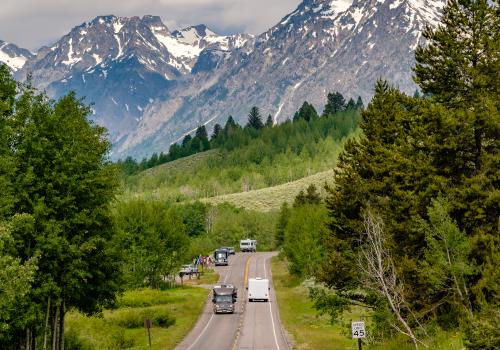
A motorhome gets terrible gas mileage, with diesel-powered engines and Class Bs giving you slightly more miles per gallon.
A lightweight travel trailer and truck or SUV combo will get better overall gas mileage over any Class C or bigger motorhome, with very few exceptions.
The second part of this equation is what happens once you reach your camping destination.
With a motorhome, you’ll need to drive the RV to get supplies or see the sights, and your fuel expenses won’t lower.
With a travel trailer, you’ll unhook the camper and be able to use the vehicle for sightseeing at a much lower fuel expense.
Verdict: Travel trailers with a tow vehicle incur lower fuel expenses overall.
Storage Considerations of Motorhomes vs Travel Trailers
It’s crucial to consider where you plan to store your camper when not in use.
Small travel trailers, especially pop-up and teardrop styles, you can park in a garage to avoid the need to rent a storage space.
Most motorhomes and large trailers or fifth-wheels will be either too tall or too long to fit in a standard-size garage.
If your county, city, or HOA laws don’t allow you to park your RV on property, you’ll have to pay for a storage facility.
Want to Connect With a Community of Over 1,078 RV Enthusiasts?
The average rates for uncovered outdoor RV storage is $65 monthly, covered outdoor storage is $85, while indoor RV storage is $250. Check out this article for more RV storage facts and considerations.
Verdict: It’s easier to store a travel trailer in most instances. Trailers don’t require any upkeep in the offseason, unlike a motorhome that requires you to start the engine every 4-6 weeks to keep it in good working order.
Motorhome vs Trailer – Which Need More Maintenance?
Motorhomes by far will require more maintenance (and costs), as it’s both a camper and a vehicle.
Another area where maintenance and costs are higher is with the tires. A motorhome will have anywhere from 4-6 heavy-duty tires that get much more wear and tear from the RV’s weight.
With motorhome tires costing anywhere from $125-$250 each, costs add up quickly.
Travel trailers don’t escape general maintenance needs entirely. They also have tires, but there are fewer of them, and they are usually less expensive to purchase and install.
Travel trailers need sway bars and properly-rated hitch equipment that may need replacement over the years.
Things such as keeping the roof leak-free, dealing with plumbing, heating, appliances, and air conditioning problems will be equal in both motorhomes and travel trailers of similar size and design.
Verdict: Travel trailers win for having a lower overall maintenance cost.
Safety Concerns Between Motorhomes and Travel Trailers
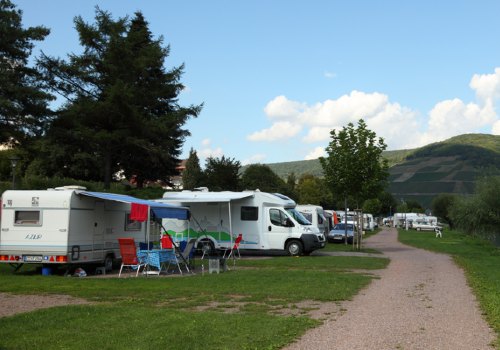
Something very few new RV shoppers consider is the difference in the feeling of safety between sleeping in a motorhome vs travel trailer.
I’m specifically talking about theft or needing to leave an area that feels unsafe quickly.
Safety Concern #1: Monitor Your Tow Vehicle
When you’re sleeping in a camper (trailer or motorhome), you’ll be well aware if someone tries to break in or mess with the outside as such sounds will wake you up.
But, when you’re sleeping in a travel trailer, you’ll rarely know if someone is messing with your tow vehicle.
In some areas, unsavory locals prey on travelers, especially if they know a campground isn’t well-patrolled.
I’ve seen many vehicle break-ins while owners are sound asleep inside their travel trailer, especially when they need to park the vehicle a distance from the camper.
Another strange observation is that tow vehicles and boats often have gas siphoned from the fuel tanks overnight.
Safety Concern #2: Motorhomes Allow for a Quick Departure
Leaving quickly… if unsafe conditions arise, it’s much easier in a motorhome than pulling a travel trailer.
Driving away in a motorhome can happen in a minute or two while it will take at least 15 minutes for even the most experienced travel trailer owners to get ready to roll.
Unfortunately, there’ll be times you’ll need to make a quick escape while RVing.
Sometimes it’s a crime happening nearby, or bad weather is coming. It could be you’ve overslept check-out, and campground management needs you to leave immediately because the new guest is waiting for their spot and jamming up traffic flow.
Safety Concern #3: the Weather
Speaking of weather, strong winds while on the road or at a campground can spring up fast. Since travel trailers are very lightweight, they’re more prone to damage or even tipping over.
Motorhomes are built on a heavy chassis and carry a hefty engine. This extra weight provides a lot more stability during windy conditions.
For example, my Class C motorhome weathered the buffeting winds of Hurricane Sally and didn’t budge, but numerous travel trailers nearby were on their side.
VERDICT: Motorhomes win hands down for making a quick escape and are much harder to tip over in high winds.
Final Thoughts on Which RV Type Is Best
The best RV fits your budget, gets you to your favorite camping locations, and provides the space, safety, and amenities you require, regardless of type.
I hope you explore each topic in this motorhome vs travel trailer guide and think about how each will impact your camper-buying decision.
No RV is perfect, but when you understand the pros and cons of travel trailers vs motorhomes, it’ll help you’ll avoid making a costly mistake!
"Man cannot discover new oceans unless he has the courage to lose sight of the shore."
-- Andre Gide

